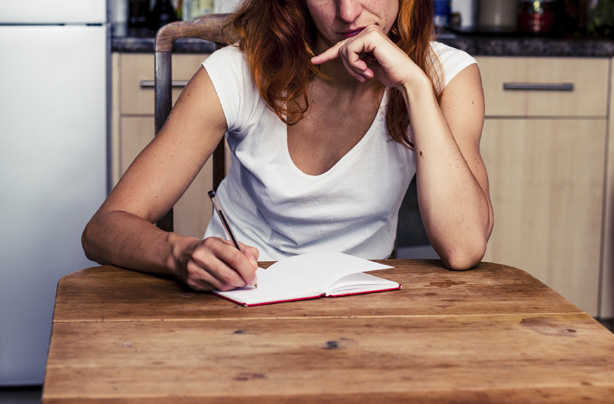How to cope with depression: Depression help, treatment and support
If you are struggling with symptoms of depression and feel like there is no hope, you should know that there are many options that can and will make you feel like yourself again.

Coping with depression is an on-going project.
There's no hard and fast rule about which depression treatment will and won't work for you, and it may take time for you to find a solution that helps you manage the condition day-to-day.
However, if you are struggling with symptoms of depression and feel like there is no hope, you should know that there are many options that can and will make you feel like yourself again.
How to cope with depression
Think as positive as possible

It sounds painfully obvious, but as mental health charity Mind says, 'If you are starting to feel depressed, it can be very easy to get into a cycle of automatic negative thoughts that then become difficult for you to challenge: you get depressed and then you get more depressed about being depressed. Being in a state of depression can then become a bigger problem than the actual difficulties that caused it in the first place.'
Use distraction techniques to occupy yourself, and try to identify patterns in negative thoughts so you can begin to address them. When you're feeling low, it's not as easy as simply switching your thought process, but making a conscious effort to approach situations is a great start to self-care.
Socialise when you feel able to
Parenting advice, hot topics, best buys and family finance tips delivered straight to your inbox.

One of the most overwhelming symptoms of depression is often a feeling of isolation - but your friends and family want to help you, so don't withdraw yourself from their support by cutting them off.
The longer you leave it, the harder it seems to reach out, so try to make contact with loved ones on a regular basis - daily, weekly, fortnightly, whatever works for you. If you really don't feel up to face-to-face meet-ups, make a phone call, send a text or even an email instead. They'll be pleased to hear from you, and even a brief conversation will remind you that you're not in this by yourself.
Establish a routine

Depression can throw your whole life out of sync, often leading to poor sleeping or eating habits. The NHS advises maintaining as much of a normal routine as possible to give yourself a sense of structure.
Spending the day in bed can seem like the preferable option, but it'll only make you feel worse in the long run. Set your usual alarm, get washed and ready for the day, and eat meals and snacks at regular intervals. You'll feel much more of a sense of achievement than if you stayed buried under the duvet.
Take up exercise

Both scientific research and anecdotal evidence show that staying active can either help prevent symptoms of depression, or ease them when they are present. Exercise activates chemicals in your brain called endorphins, which reduce your perception of pain and trigger a positive feeling in the body.
Swimming, running or walking and team sports are all excellent activites that will stimulate both your muscles and your mind; it comes down to finding an activity that suits you. Remember, it doesn't need to be a conventional 'sport' - even getting out into the garden or going for a stroll gets your body moving and releases the same hormones.
Other alternative or natural remedies for depression, like mood-boosting foods and supplements, may not be a complete treatment on their own, but can also help to lessen your symptoms.
Avoid unhealthy coping mechanisms

Just as healthy living, exercise and lots of sleep can soothe you, relying on substances like alcohol, cigarettes and caffeine can cause you further difficulties - particularly alcohol, as it is a known depressant.
According to the Royal College of Psychiatrists, 'Alcohol can be a very effective way of feeling better for a few hours. If you are depressed and lacking in energy, it can be tempting to use alcohol to help you keep going and cope with life. The problem is that it is easy to slip into drinking regularly, using it like a medication. The benefits soon wear off and the drinking becomes part of a routine.'
If you start to feel like you 'need' a drink, begin drinking earlier in the day, or your work or relationships begin to suffer, it's advisable to stop drinking, either independently or with medical assistance.
Join a self-help group

Talking to your friends and family is certainly helpful, but speaking to someone who is also experiencing depression can offer a fresh perspective, as well as advice on coping methods that work for them, and may work for you too. Self-help groups are often led by people who have overcome depression themselves and will be able to empathise and support you through your own journey.
To find a group in your area, visit Mind, whose centres support more than 400,000 people across England and Wales, or ask your GP for more information.
Allow yourself to seek out enjoyment

Many people with depression feel like they don't deserve positive experiences, but the truth is that pampering yourself is an important part of care and recovery. Eat the cupcake, run the bubble bath, arrange a trip you've always wanted to take - whatever you decide to do with your time, ensure that it's something that will make you feel happier and more empowered.
Setting yourself small, achieveable goals can also provide a huge sense of satisfaction long-term. It doesn't have to be a giant leap from facing the day to facing your entire career or life ambition; make a list of just two or three ideas, then work your way through them at your own pace. You'll surprise yourself with how much you can achieve.
Speak to your GP

Most people diagnosed with depression are treated by their GP who will help them manage their condition. A small minority of people may be referred to a psychiatrist or a member of the local Community Mental Health Team for specialised help. Depending on your symptoms, the severity of the depression, and your circumstances, your GP might suggest anti-depressant drugs, some form of talking treatment or a combination of both, although in severe circumstances hospitalisation may be recommended.
Talking treatments typically include cognitive behavioural therapy, which helps to identify and change negative feelings, or mindfulness-based cognitive therapy, which focuses on living in the present moment and dispelling fears about the future, usually in a group environment. You may also be offered counselling.
If medication is prescribed, it is usually some form of antidepressants, which increase levels of a group of chemicals in the brain called neurotransmitters. Certain neurotransmitters, such as serotonin and noradrenaline, can improve mood, leading to a relief in symptoms. However, antidepressants do not address the causes of depression, and so are usually used in tandem with other treatments.
For more information on managing and treating depression, visit nhs.uk.
Trusted, informative, and empathetic – GoodToKnow is the ultimate online destination for parents. At GoodtoKnow, our mission is 'simple': we're trying to make sense of parenthood. On the site, you'll find everything you need for a happy, healthy family life. Our huge archive of content includes more than 18,000 articles and 1,500 how-to videos. These include expert-backed advice features on parenting, dealing with relationship changes after having a baby, self-care for mums and managing your family finances. We also feature tried-and-tested product reviews and buying recommendations for every stage of family life - from prams and Moses baskets to birthday gifts and top toys.